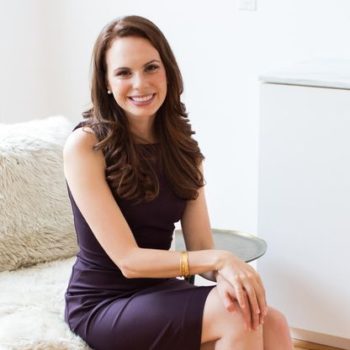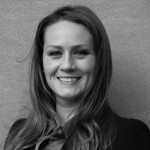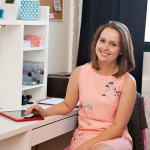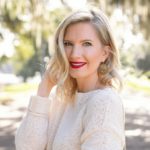Today’s career profile features someone I admire for her generosity, creativity, and tenacity. After graduating from college, Erin Zaikis worked at a corporate job before leaving to start her own nonprofit, Sundara. I am so thrilled to share her story and advice with you today.

I love the story behind Sundara. Could you please tell my readers your moving story?
I am someone that had never once given a conscious thought to soap before. It was like air to me — I took it for granted and assumed it would be everywhere I needed it. Until, one day, it wasn’t. Last year I was working in a small village in Thailand for a nonprofit that combats child trafficking. I went to visit a school and went to the bathroom – and tried to wash my hands at the sink afterwards but could not find the soap. I asked a group of middle school-aged students nearby if they had any soap and they shrugged and said “What’s soap?” I didn’t believe them. It blew my mind that these students had sinks and running water – but no soap. So I drove to the neighboring town, bought out their supply of soap and brought it back with me. I watched as they opened the packages of soap and clawed at the bars, some smacking it against their heads, having absolutely no idea what to do with it. It was like the way my 10-year-old self would have looked at an iPad! Then I realized, so many organizations focus on clean water but who is working on providing soap and hygiene education to these communities?
Upon my return to the U.S., I quit my job and decided I had to do something about this. I founded a soap company that funded sustainable hygiene programs in Haiti, Ghana and India. Over the summer, Sundara rebranded as a nonprofit, after securing corporate funding from LinkedIn.
How did you come up with your name?
Sundara means beautiful in Sanskrit. When I founded Sundara, I was in my early twenties and struggling with the idea of beauty, perhaps like most girls my age. I had just come back to New York from Thailand and went out and listened to my friends talk about these “beautiful” girls on Instagram with thousands of followers and “beautiful clothes” and saying how much they wanted to be like them. I had a moment where I felt depressed and thought…is this real beauty? Being skinny and trying to look flawless and taking pictures of yourself to show off to others? It made me upset. I had just met some of the most beautiful people in my life in this village and they were never going to have thousands of followers and get half the recognition that these Instagram celebrities were getting. I’m talking people who gave selflessly, who worked towards a better future, who sacrificed to educate their children. I decided I wanted to do my part to change the conversation and give those women some recognition. Real beauty is on the inside. It’s helping others, it’s fighting for a better future, it’s all the things our community educators are doing with Sundara and I wanted to highlight that amazing beauty within.
Sundara solves a problem in an innovative way. Could you explain the problem it solves and your process for making the soap?
There are hundreds of millions of people in this world who don’t have access to soap. There are 70 million people in India alone who don’t know what soap is and have never used it before. The consequences of this are huge – approximately 3.5 million die of diarrhea and respiratory diseases each year, according to the Centers for Disease Control and Prevention. That’s more than the entire population in the state of Connecticut. Every year. These are preventable diseases, which makes that number even more of a shame.
Soap is the single most effective way to prevent childhood death – both more effective and cheaper than vaccines, medications, or clean water initiatives alone. The CDC ran a series of studies in Pakistan recently, which showed that in one year, with handwashing instruction and a year’s supply of soap, it is possible to reduce the rate of these childhood illnesses by 50%. That’s 1.75 million children that can be saved by something as simple as a bar of soap. It’s a low cost, low technology way to save lives and empower children to take their health into their own hands.
When I was 19, I remember staying at a five-star hotel with my parents in Mumbai and looking out the window to see a group of twenty or so beggar children, shoeless, covered in mud, dumping a trash can over and scraping through the garbage. I was haunted by the inequality and unfairness of that situation. While this hotel was throwing away hundreds of bars of partially used soap every day, there were people a few yards from it who had never seen soap in their life. Soap provides dignity – I believe it’s a right to be clean. So my dream has been to give more people this right.
We launched our soap recycling initiative this year in Mumbai — it’s a city of 19 million with Asia’s biggest slum and the world’s only billion-dollar house. Contrast to the extreme! We are working with six luxury hotels in the city to collect their used bar soap. We have hired women from a nearby slum at a fair wage and trained them to process and sanitize the soap so it is fit for use again. The soap is then distributed two ways: as an incentive for good school attendance in urban slums, and as a handout to rural villages outside the city that face a soap deficit. We also train teachers and community leaders on hygiene modules so they can teach children and caretakers about hand washing and other methods of preventative health care. This is critical so the good hygiene habits will stick and we will be able to make more of an impact in these communities over time.
What is one thing that you wish you had known when you were starting out your career?
I wish I had known that it’s ok to ask for favors. That took me a while, as I’m a naturally shy person and thought that there was some sort of glory to be had by ‘doing it all by yourself’. Then I finally realized, you’re not going to get anything unless you ask for it. What’s the worst that can happen? Someone says no to you? Ok so they so no – and trust me, you’ll live. It’s tough dealing with rejection all the time but if you’re not getting rejected, it means you’re not trying your hardest to make something happen. Plus, I’ve realized that when you ask in the right way a lot of people will be flattered that you would want their assistance, opinions, etc. and will be glad to help.
What has been the biggest challenge and, on the flip side, the biggest reward of starting your own business?
The biggest challenge is overcoming self-doubt. There will always be the voice inside you that says “Is this stupid? Could I really ever do this? Do people think I’m that crazy soap lady?” It’s been tough to silence that. I can be my own worst enemy: throughout my life, there are plenty of things I held back on just because I worried what other people would think of me and doubted my own capacity. It’s been scary and yet at the same time so freeing to let that go and finally do something I really want to do. I know that this career isn’t what other people had in mind for me. But I’m doing it, and it brings me joy and I think that’s pretty good for now.
It’s incredibly rewarding to see pictures and videos of the communities we help, but surprisingly, the biggest reward for me has been the random emails and Facebook messages from people – some of whom I don’t even know, saying that they heard my story and were inspired to take a risk, follow their heart, or pursue a passion. It’s incredibly flattering. If I can help a few people and provide encouragement for someone to take risks and live their dreams, well then, I think this has all been worth it.
What is a typical day like for you?
Lately, I’ve been working on our India project so I work India hours (9.5 hours ahead of EST) and let me just say it’s wonky! I’ll stay up until 3 or 4 am taking Skype calls with our ground team there – then go to sleep for a few hours, wake up for some early morning calls, do some emails, and then try to enjoy the afternoon in the city with my puppy. I work from home most of the time but that can get quite lonesome so I make it a point to go for walks, meet friends for tea dates and go to a SoulCycle class with my sister if I’m super stressed out. I’ve realized in order to do good work I need to have balance or else I get sick and run down. I’ve started to make it a point to be kind to myself – something I never used to make time for before. You can’t take care of others if you’re not taking care of yourself first.
You have been visiting schools in India to create handwashing stations and educate students. Could you tell me a little bit about some of your trips, maybe a favorite memory?
Last month I got to go to India to help set up our soap recycling initiative there. Goodness — it was the most intense trip of my life. My luggage was lost for five days and I was going to meetings in the same shirt I had arrived in. Plus I couldn’t find safe food to eat in the slums so I ate six Kind bars a day. I took the word “crabby” to a whole new level, let me just tell you. Our workshop where we recycle soap is in the slums and unfortunately is right next to a sewage stream so I would tie my shirt around my face so I wouldn’t gag. Ok, so let’s just say it wasn’t glamorous. But it was so necessary to go and see the conditions first hand. It’s just so unimaginable when you’re coming from the US.
We conducted surveys to ask these children how often they were washing their hands. Some would scream “Once a week!” to me proudly. Some admitted they only washed their hands in the shower or would say they washed their hands when they washed their clothes and that was enough. Those that did wash their hands often had no idea why they were even doing it. Then I would listen to women talk about their children who had died of pneumonia or diarrhea — things that can be solved with hand washing, things that hardly any American children die from. Realizing that the problem is real made me so much more connected to the cause.
The most rewarding part of the trip was the end when 17 teachers in the slums had been trained in a basic hygiene curriculum and all of our female employees at our workshop had become well versed in hygiene knowledge. Even if just one of those teachers or mothers makes an impact on one child and he or she doesn’t die of a preventable hygiene-related cause, I feel our work there has been a success.
Where do you see yourself, and your company, in the next five years?
Ideally, I’d like to get more local involvement in each of our projects. I take so much joy out of being able to have my own nonprofit, but I know that in the end, this will work better if we hand over the real ownership to the locals and have the support and trust of every community that we work in. On a domestic level, I hope that we can increase awareness of the real hygiene and sanitation issues around the world. I believe that acknowledgment is the first step in fixing any issue, so if we can draw more interest in this issue, one day in the not so distant future no child will be asking what soap is. That would be a dream come true!
What is your favorite quote?
There was a quote by Jackson Kiddard that really resonates with me about living your dreams. I save it and look back on it often, whenever I’m struggling a bit, “The price you have to pay to live your dream is facing your deepest darkest fear and the reward you receive from this courageous act is the realization that your fear was an illusion and that your dreams were always real.”
What is on your desk right now?
I have a set of $3 bangles that I got from India (everyone thinks they’re real gold when I wear them…hey, whatever works, right?). I also have a pack of Orbit Wintermint, a list of my expenses that I still have to process (ugh), chapstick and a candle I made, and vanilla mint tea. Vanilla mint tea is the best so if you haven’t tried it yet, please do yourself a favor and go get some.
Who is your mentor?
My grandmother, Hope, was the biggest rockstar I’ve ever known. She was wildly generous, brave, and funny. She made friends with everyone – from fancy real estate moguls to the women who greeted her at Costco and spent her free time volunteering with children with special needs. She taught me that while society might place a huge emphasis on being pretty, smart, skinny, and having that “amazing” job, the people that have the biggest impact in your life are the ones who are kind and selfless. Since her passing, I’ve tried to be the mentor she was to me to others — but I feel like I’ve got a while to go.
What is the best advice you’ve ever received?
My sister always told me, “Fake it until you make it!” I only started listening to her recently. Let’s be honest, most of us have no clue what we are doing. I would shudder when people would use the words “entrepreneur” or “business owner” to describe me, thinking “Wow! they must actually think I’m some glamorous big shot, but who are they kidding?” I still talk about this with my girlfriends a lot: many of us have a huge confidence gap in our careers and feel like impostors. I can tell you a list of 10 things I’m not good at right now but it would take me a few minutes to think of 3 strengths. Why are we so hard on ourselves? My sister always told me to talk with confidence and act like the person I wanted to be seen as. It’s still such a struggle for me but it’s amazing what a difference a change in attitude can have in your interactions with others.
What advice do you have for other young professional women?
Without great risk, there would be no great reward. If you have a dream that seems wild, but you really believe in it with your heart, go with it and don’t stop. There will always be those that doubt you, the pressures of society, and your parents’ expectations – but let it go for now. Accept the fact that you will have bad moments. I’m talking days with no sales, weeks when everything goes wrong, website crashes, and people who just slam the door in your face. These mistakes won’t kill you, in fact, they build character, and one day (in the not so distant future) you’ll be laughing about it. The world needs more people who take risks – be one of them!
Love Sundara as much as I do? Follow along on Twitter, Facebook, and Instagram!
































Pingback: Small Business Saturday: Some of My Favorite Women Owned Small Businesses | The Preppy Post Grad
Pingback: Four Ways You Can Support International Women’s Day | Elana Lyn
Pingback: My Favorite Career Profile Quotes From 2015 - Elana Lyn
Pingback: NYC Guide: 5 Things I Loved This Week - Elana Lyn